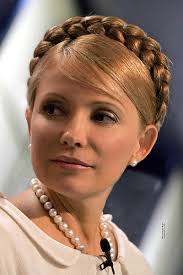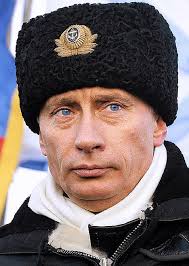Yesterday was the celebration of Victory Day:
May 9 is the 65th anniversary of the end of World War II, a holiday called “Victory Day” in most countries of the former Soviet Union. But Ukrainians had a profoundly different experience of the war. Along with the Belarusians, they suffered the greatest losses of any country during the war, as both the German and Soviet armies passed through their land twice in advance and in retreat.
…Yale University historian Timothy Snyder has written that had the Holocaust not occurred, Nazi Germany’s treatment of Soviet prisoners of war would likely be seen as the greatest war crime of the 20th century.
But the Nazis weren’t the first to use hunger as a weapon of mass destruction in Ukraine. Less than a decade earlier, Soviet dictator Joseph Stalin had starved millions of Ukrainian peasants into submission because they’d refused to work on collective farms. In 1932 and ’33, Ukrainian villages and cities were filled up with the corpses of men, women and children.
“And after this, the Ukrainian peasantry have no opportunity as to wait for liberator. Such liberator they consider Hitler. Thats why Hitler so easy take Ukraine.”
Vladislav Grinevich is a historian at the National Academy of Sciences of Ukraine. He says a lot of Ukrainians desperately wanted out of the Soviet Union. After the famine, the Ukrainians didnt want to fight for Stalin. Many deserted the Red Army in droves or surrendered willingly to the Germans.
“And very many Ukrainians thought that Hitler liberated Ukraine from Stalin through – but Hitler was not better, maybe in some sense worse for Ukrainians than Stalin.”
During the occupation, the Nazis obliterated tens of thousands of villages, starved the residents of Ukraine’s capital, Kiev, and deported more than two million civilians – mostly women and children – to work as forced laborers in Germany and Austria.
“It was not a very simple choice for Ukrainians which army to serve.”
…Ukraine lost one-sixth of its entire population during the war. Historian Vladislav Grinevich says in the end the war was a Victory for Stalin but not for Ukrainians. And tomorrow’s Victory Day holiday, he says, should be a reminder that the great patriotic war wasnt so much a heroic event as a collective tragedy.
Russia’s Victory Day ceremonies held Sunday in Moscow included troops from four NATO countries for the first time.
About 1,000 soldiers from the United States, Britain, France and Poland marched alongside Russian troops through Red Square to mark the 65th anniversary of victory over Nazi Germany in the Second World War.
…“Today at this solemn parade, the soldiers of Russia, the states of the CIS [Commonwealth of Independent States] and the anti-Hitler coalition march together,” President Dmitry Medvedev said in his address to the troops.
In the week leading up to Victory Day, Medvedev several times raised Russia’s frequent complaint that other countries denigrate or misconstrue the Soviet Union’s contribution to the Second World War, in which more than 26 million Soviets are estimated to have died, including more than 8.5 million soldiers.
But he mentioned the issue only in passing on Sunday and the address reflected his aim of reducing Russia’s confrontational image.
Russia urges Ukraine to cooperate in the comprehensive consolidation of the potential of the Commonwealth of Independent States.
This position was expressed by Russian President Dmitry Medvedev who chairs the Council of the Heads of Member States of the CIS during the informal CIS summit in Moscow on May 8.
“We are prepared for the closest cooperation with Ukraine in the business of comprehensive consolidation of the potential of the Commonwealth of Independent States,” said Medvedev having congratulated Ukrainian President Viktor Yanukovych on joining the Council of the Heads of Member States of the CIS.
…As Ukrainian News earlier reported, Ukrainian President Viktor Yanukovych on May 8 was on a one-day visit to Moscow to take part in an informal summit of the Commonwealth of Independent States.
On the one hand is the nostalgia of the elderly, some of whom view the social security and superficial orderliness of Soviet society during the Stalin years. On the other hand is the knowledge that has now come to light in Russia itself of Stalin’s treachery and paranoia. One of the factors that increased Soviet human and material casualties in the “Great Patriotic War†was Stalin’s misplaced trust in the Germans that led to the German Soviet Friendship Treaty of 1939. This left the USSR totally unprepared for the German invasion of the USSR in 1941. The USSR had made no provisions for German treachery and suffered heavy losses in the months that followed the German invasion.
Additionally, the Soviet military leadership was badly depleted by Stalin’s purges. The Soviet victory was not only a case of having overcome the Nazis but of having won in spite of Stalin’s paranoia.
An honest rendering of World War Two history would have to include Josef Stalin. But it would also have to include the millions he killed due to his unchecked paranoia.
Over 3,000 tanks were involved in a single battle at Prokhorovka on July 12, 1943, when the Germans mounted their last offensive on the Eastern Front at the battle of Kursk Salient. Russia and Belarus have equated their contemporary states directly with the war victory. Ukraine was ambivalent until the recent election victory of Viktor Yanukovych, who has opted to ignore the fact that thousands of Ukrainians fought against the return of the Soviet occupants between 1944 and 1953.In these early weeks 400,000 Red Army soldiers perished and 280,000 were captured. Despite having forces comparable to or superior to those of the German Wehrmacht, he continues, the Red Army fled. “No such example is to be found in all the theatres of World War II.”The surviving defenders of the Brest Fortress were arrested once the Red Army liberated German prison camps and deported to the Far East, where most remained until the late 1950s. The Brest Hero Fortress, as well as several Hero Cities, was not recognized until the 1970s when the Brezhnev regime elevated the war to its contemporary propagandistic level.But it has become impossible in Russia in particular for historians to criticize the official narrative of the war. The result is a version of events that bears little relation to reality and where memories are only valued if they conform to the prevailing line.
So few know Ukraine’s role in World War 2:
On September 1, 1939 Germany invaded Poland to begin WWII. According to the Nazis, Ukrainians were listed as sub-humans along with the Jews. At this time 40 million Ukrainians lived in the land Hitler decided was to be used as the new living space of the German nation. On June 22, 1941 Hitler began his “drive to the East†by invading Ukraine on his way to Moscow.
…
In line with Stalin’s scorched earth policy, the Russian army made sure to destroy a large amount of Ukrainian land and resources before they were taken over by the German army. Since the government of the Ukrainian SSR fled the country, it could not be considered a collaborator of Germany. Ukraine was instead occupied by a variety of national forces.
There were attempts to establish an independent Ukrainian government, but the Germans put them down and their leaders were arrested. The Ukrainian Insurgent Army (UPA), founded in 1942, numbered about 200,000 men and women. They fought both the German and Russian armies in an attempt to win independence.
Germany’s first plan was to kill all men in Ukraine over 15, but then they decided instead to work them to death while supporting the German war effort. All Ukrainians were forced to wear a badge, identifying them at all times. This process allowed them to be abused by any German at any time. The German army imposed starvation rations and the most primitive accommodations. Many Ukrainians were deported to Germany to perform slave labor. Some died in Allied bombings, and only a few survivors were released back to their homeland.
According to this book, Ukrainians lost proportionately more people in WWII than any other European country, although the exact number was never established. The best estimates are that approximately 10 million citizens were killed between 1939 and 1945, as well as about 600,000 Ukrainian Jews. When the Nazis left Ukraine in 1943 and 1944 they destroyed everything the Soviets had left behind in 1941.
In Ukraine, however, the war did not end in 1945:
It lasted well into the 1950s as Moscow sought to establish its rule over the parts of Ukraine where Bolshevik rule was not welcome. The Soviet Union had the Red Army and the NKVD. Liberation-minded Ukrainians had the UPA guerrilla army and support of the local population. Veterans of all these formations live side-by-side in independent Ukraine today. And every year around this time, the question is asked: Is their reconciliation possible?
 In spite of physical weakness as a result of his exile, Shevchenko’s poetical strength was inexhaustible, and the last period of his work is the highest stage of his development. In a series of works, the poet embodied the dream of the people for a free and happy life. Shevchenko understood that the peasants would gain their freedom neither through the kindness of the tsar nor through reforms, but through struggle.
In spite of physical weakness as a result of his exile, Shevchenko’s poetical strength was inexhaustible, and the last period of his work is the highest stage of his development. In a series of works, the poet embodied the dream of the people for a free and happy life. Shevchenko understood that the peasants would gain their freedom neither through the kindness of the tsar nor through reforms, but through struggle.

 Ukrainian communists on Wednesday unveiled a controversial monument to Soviet dictator Joseph Stalin, despite angry criticism from nationalists.
Ukrainian communists on Wednesday unveiled a controversial monument to Soviet dictator Joseph Stalin, despite angry criticism from nationalists. The Kremlin’s influence in Ukraine is increasing rapidly. This is the impression one gets when visiting Ukraine after the election that brought pro-Russian politician Viktor Yanukovych to power.
The Kremlin’s influence in Ukraine is increasing rapidly. This is the impression one gets when visiting Ukraine after the election that brought pro-Russian politician Viktor Yanukovych to power. crucial test of her support amid growing controversy over the succession of deals Ukraine has agreed with Russia in the last weeks.
crucial test of her support amid growing controversy over the succession of deals Ukraine has agreed with Russia in the last weeks. Prime Minister Vladimir Putin’s proposal was Russia’s boldest move yet and would allow Moscow to control its gas transit to Europe. Ukraine’s opposition leader Yulia Tymoshenko said the deal was part of “a plan to destroy Ukraine.”
Prime Minister Vladimir Putin’s proposal was Russia’s boldest move yet and would allow Moscow to control its gas transit to Europe. Ukraine’s opposition leader Yulia Tymoshenko said the deal was part of “a plan to destroy Ukraine.” Yanukovych told the Council of Europe on Tuesday that he considered the famine “a shared tragedy” of all people who were all part of the Soviet Union, then led by Joseph Stalin.
Yanukovych told the Council of Europe on Tuesday that he considered the famine “a shared tragedy” of all people who were all part of the Soviet Union, then led by Joseph Stalin.